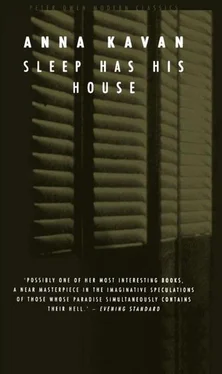Against the basic motif, moving roughly horizontally, but in a fluid, swerving, weaving band, a stream of dancers, men and women in couples, appearing small at left, gradually enlarging centre (certain couples enormously), diminishing again as they move towards right. As the dancers individualize they are seen to be of all ages, classes and nationalities, stepping their various rhythms to a jumble of distant dance tunes further confused with intermittent far-off blaring of martial music. No face remains prominent long enough for complete apperception, but continually changing details emerge. A schoolboy in Eton jacket partnering a heavy fly-blown woman of fifty with bull-neck and sparse blue marcelled hair. A hard, judge-like man of about sixty-five, personifying the more hidebound and sadistic type of disciplinarian, woodenly placing his feet in bright patent leather shoes. Simpering over his stiffly encircling arm, a horribly travestied sweet young girl of sixteen in perfectly transparent white muslin; the rouged points of her breasts stand out through the white like the red spot on a tarantula. A poet-like, precious young intellectual, spectacled, wearing a silk shirt and otherwise a baby’s napkin, is dancing with a big black negress whose far-too-tight satin dress is bursting at every seam. His twin brother, identical except that his face is redder and that he wears an eyeshade instead of glasses: in his case a striped and monogrammed blazer goes with the napkin. His partner a Peter Amo blonde with the usual trimmings. A dear old lady in white fichu and cap; her swollen ankles teeter dangerously over three-inch-pinpoint heels studded with brilliants. An overalled surgeon, sinisterly grotesque with his gauze mask and rubber gloves. A yellow gentleman flashing yellow diamonds. A bus-driver in uniform. A very dignified, polished, bearded member of the Académie Française attired in full tenue de soir with the Legion of Honour in his buttonhole. Fliers, bellboys, witch-doctors, scientists, typists, waiters, beauty queens, parsons, racing cyclists, whores, sandwichmen, cooks, schoolmasters, prize-fighters, Chinamen, kings. These people can be rearranged indefinitely to include any combination, as they waltz or shuffle or glide or rumba or tango or walk or whirl or whatever across the screen.
The third theme has as its accompaniment sentimental song-hits of the most saccharine variety, which fragmentarily make themselves heard cross-jangling the other tunes. Equating pictorially, numerous quick flashes flicking about the screen with glimpses of conventional love scenes in gardens, conservatories; a girl and boy on a staircase embracing; an enlaced couple leaning over a steamer rail and watching the moon rise (moon is searchlight); mouths searching, clinging; hands (male and female) fumbling, stroking, clutching, questing, trembling, gripping other hands, bodies, slipping straps from shoulders, unfastening buttons; shot, from above, of a man and girl in bathing-suits pressed together in a tight clinch on a beach; close-up of the girl’s upturned, imbecilic, nympholeptic face. Various erotic flashes, in boats, cars, bedrooms, parks, dance-halls, etc. None of the shots, which break out at random all over the screen, lasts for more than a second. The effect is rather that of looking at a high building in various parts of which windows are lit up one after another as lights are switched on and off in the different rooms.
Music increases to utmost confusion of dance bands, military bands, crooners, as something whitish, roundish, rises from centre base and slowly travels straight up like a balloon, like a bubble, traversing the whole height of the screen. Maybe it’s an igloo; maybe it’s an egg. Up it goes, steady and sedate, and inside it B is sitting cross-legged, reading a book. Just as the bubble, the balloon, the igloo, the egg, or whatever it may be, reaches the top of the screen it explodes quietly with a smothered genteel belch.
The bubble-plop signals disruption of the combined themes. The dancers and lovers blow madly in all directions; fly apart; disintegrate: they and the music vanish together.
The ranked figures continue their unassertive march for a few seconds, until it becomes clear that they are quite young boys in some sort of uniform, Boy Scouts perhaps, or members of some other youth organization.
The troop of about twenty boys marches along a dusty road in full summer sun. The marching is not at all smart, several boys are out of step and others have broken rank and are lagging behind. They are all hot and tired and quite considerably bored. One who has a blistered heel scuffs along barefoot with his shoes in his hand.
At right, parallel to the road, from which it is separated by a wire fence bearing No Trespassing notices, a cool, shimmering lake with flowering flags growing to the edge of the water. A freshly painted row-boat is moored to a miniature jetty. Opposite this the march falters, breaks down completely, the boys straggle up to the fence, bunch together there like young cattle, eyes focused enviously on the boat and the water. Simultaneously with the break up of the march, from behind some willows on the other side of the fence, two smiling girls (one is unmistakably B — could the other be A in her younger days? It’s impossible to tell really, they’re so much alike) appear on the sunlit slope. Smiling into one another’s faces, oblivious, selfcontained, they walk hand-in-hand to the jetty, unfasten the boat, get in and row out and away, towards the centre of the lake.
From the level of the boys’ eyes, through the thick wire mesh, as if looking into a cage, the boat shown withdrawing swiftly, with extreme effect of solitariness, inaccessibility; diminishing into a toy, a waterbird, a floating leaf in the distance; vanishing.
OUT of my urgent need I found the way of working a new night magic. Out of the night-time magic I built in my head a small room as a sanctuary from the day. Phantoms might be my guests there, but no human could enter. Human beings were dangerous to me, like tigers prowling at large in the daytime world. Inside my secluded room I felt safe from the tigers I sometimes envied. Sometimes a savage beauty lured me into the sun and I would start to love the danger a little. On these occasions I felt the reluctant love drained painfully from me as blood drains from a deep wound. The tigers lapped my love’s blood and remained enemies. The inhabitants of the day laughed at the gift I wanted to bring them, and I shut myself in my inner room to escape the betrayal of their arrogant mouths.
SOMEONE IS running madly up and down stairs. What devilish torment can hunt the poor fellow like this? No sooner does he reach the foot of the staircase (it’s short, mercifully, but quite steep), than he turns and is off to the top as fast as he can go. Then down he rushes at once, almost tripping over his own feet in his crazy haste to get to the bottom and start climbing again.
So he keeps on, up and down, up and down, up and down, like a caged squirrel or a mouse caught in a treadmill. Such agitation is horribly painful to watch. One holds one’s breath in suspense, waiting for him to fall badly and break an arm or a leg: or else his heart must surely give out and he will have a collapse of that kind. Already he’s worn to a shadow, a wraith, whose features are too ghostly to be recognizable.
Each moment he grows more shadowy, more transparent. He’s getting smaller and smaller too, as the altering dream perspective banishes him to the distance where, finally, his frantic restlessness is no more disturbing than the activity of a spider within its web.
Are these clouds or mountains which now blossom like huge flowers in the glowing light of the sky? They might even be figures, solemn supernatural beings, archangels or gods, with faces masked in their own radiance. Light steadily fills the whole dream until there’s no room for anything else. Even the dis-embodied voice of the Liaison Officer can barely squeeze itself in, so that only fragments are heard of the lines he is reading about
Читать дальше












